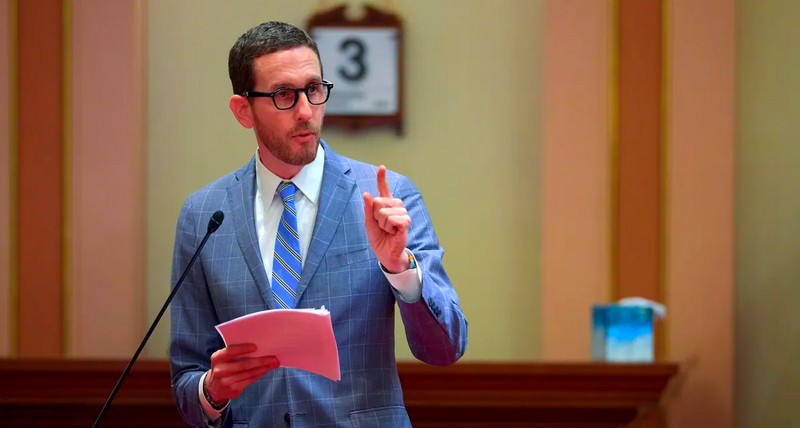
Supporters of a bill introduced by Sen. Scott Wiener, a San Francisco Democrat pictured in the Senate on Jan. 3, 2024, say the Legislature should consider an override after the governor's veto.
Nearly all of the 189 bills vetoed by Gov. Gavin Newsom this year passed the Legislature with support from more than two-thirds of lawmakers — meaning the same votes from those legislators would be enough to override the governor’s veto.
But that almost never happens. In fact, the last time the Legislature overrode a governor’s veto was 1979.
So why don’t legislators fight for the bills that have such broad support?
Party loyalty, and self-protection, says Dan Schnur, politics professor at the University of California, Berkeley, USC and Pepperdine University.
“A governor who’s been overridden is generally not a happy governor — and unhappy governors tend to issue more vetoes, especially against the members who voted to override,” he said.
The current Democratic supermajority — 93 of 120 seats – also means that a legislator who goes against the governor can be easily replaced among the politically favored.
In other words, Schnur said, it’s the modern-day version of, “if you come for the king, you’d best not miss.”
Monday was the deadline for the governor to act on the 1,206 bills the Legislature sent to his desk of the 2,159 introduced during the regular session this year. Newsom vetoed about 15.7% of the total bills passed – slightly higher than the state’s 15% average in recent years.
Of the 189 vetoes, 170 of the bills — about 90% — passed by more than a two-thirds majority in both the Assembly and Senate, according to a Digital Democracy analysis. About 96% of the vetoed bills passed with a two-thirds majority in at least one chamber.
A veto override requires a two-thirds vote in each chamber: which would mean at least 54 members in the Assembly and 27 in the Senate. (Democrats currently make up 62 of 79 Assemblymembers, and 31 of 40 state senators).
The governor vetoed bills for different reasons, as expressed through his veto messages. According to an analysis by lobbyist and Capitol-watcher Chris Micheli, Newsom rejected 30% of bills due to budget concerns and 27% due to disagreements over policy. He vetoed another 22% because he said they were unnecessary or stepped on the toes of other state agencies or local governments.
Asked whether the number of vetoed bills that passed with broad legislative support showed a disconnect with the executive branch, Izzy Gardon, a spokesperson for the governor, said: “The executive branch and legislative branch are independent branches of government. The governor’s decisions on legislation are made solely on the merits of each bill.”
The last veto override in 1979 was on a bill by then-Assemblymember Lou Papan that banned banks from selling insurance. It was vetoed by then-Gov. Jerry Brown. It was the second override of a Brown veto in 11 days.
If there is going to be an override, legislative leadership would have to be involved in the political mutiny.
Senate President Pro Tem Mike McGuire, a Democrat from Santa Rosa, showed some willingness to stand up to Newsom recently by initially refusing to convene the Senate for the governor’s desired special session on gas prices. He declined to comment, however, on when he would consider an override of a governor’s veto.
Robert Rivas, speaker of the state Assembly, also declined to comment.
Thad Kousser, politics professor at the University of California, San Diego, said one reason the Legislature may let a governor’s veto go unchallenged is to let the governor do the dirty work.
“They’re happy to let the governor be the naysayer and kill the bill without them having to vote against it,” he said.
Sen. Scott Wiener, whose bill to reduce drug costs was vetoed last month despite broad support, described the governor’s action as “a really, deeply bad veto,” but he stopped short of calling for an override.
The bill, which had both Democratic and Republican co-authors, passed with wide margins in both chambers: 70-0 in the Assembly and 38-2 in the Senate. If signed, it would have required licensing of pharmacy benefit managers — companies that serve as intermediaries between insurance companies and drug manufacturers to process claims and negotiate drug prices.
The governor said in his Sept. 28 veto message that he didn’t think the licensing plan would address rising drug costs, and that more data was needed.
But Susan Bonilla, chief executive officer of the California Pharmacists Association, which sponsored the bill, pushed back on that reason. She said a study was already done in 2020, and those recommendations were added to the bill.
Bonilla — a former Assemblymember from 2010 to 2016 — said the Legislature should consider a veto override rather than try to pass a bill again next year because patients’ access to medication is a pressing issue — and implementing protections will take time.
She added that sponsors have spent years working on the bill with various legislative committees as well as with the state’s insurance and justice departments.
To go through the process again, she said, is not a wise use of legislators’ time or taxpayers’ resources.
“We had our elected representatives strongly support this bill,” she said. “They see the need for it, and I think it’s very, very important that they push ahead and seek a veto override.”
Wiener, a San Francisco Democrat, told CalMatters he was evaluating next steps for the bill, including reintroducing it next year.
“I firmly believe that the Legislature should be willing to override vetoes from time to time,” he said. “We are a co-equal branch of government, and we have the power to override. I’m not saying we should do it willy-nilly, but periodically, on important issues, we should be willing to override.”
That said, since it hasn’t happened in nearly half a century, Wiener isn’t holding his breath.
“It’s been a cultural dynamic in the Capitol where veto overrides just don’t happen,” he said. “I think the thinking is, work things out ahead of time, which, of course, is always the preferred route,” he said. “But in a case like this … there’s nothing really to work out.”
Some legislators also say they understand the governor’s reasons for a veto of their bills.
Assemblymember Juan Alanis, a Republican from Modesto, gave credit to the governor for keeping the state’s budget in mind when he vetoed Alanis’ bill on homelessness and youth unemployment.
The bill passed unanimously through nearly every committee; by 97% in its Assembly floor vote and 100% support in the Senate.
“I believe as legislators, it’s our duty also to be mindful about where the taxpayers’ dollars go, so I also see where he’s coming from,” he said.
Alanis said he’ll take the cost concerns the governor listed in his veto message into consideration, and try again next year.
If the Legislature were to override a veto, they might only have that option so many times, he said. That’s why he thinks it’s worth reserving that option for the big issues worth fighting for — public safety issues, for example.
“I think, and I hope and I wish that we would push it and use our authority on that,” he said. “I guess time will tell if we’re going to be doing that in the future — if he does veto some bills that we really, really feel need to happen here in California.”
FOR THE RECORD: The number of votes in the Senate and Assembly needed to override a veto was corrected from an earlier version of this story.
Thomas Gerrity, a member of the Digital Democracy team, contributed to this story.
CalMatters.org is a nonprofit, nonpartisan media venture explaining California policies and politics.


















